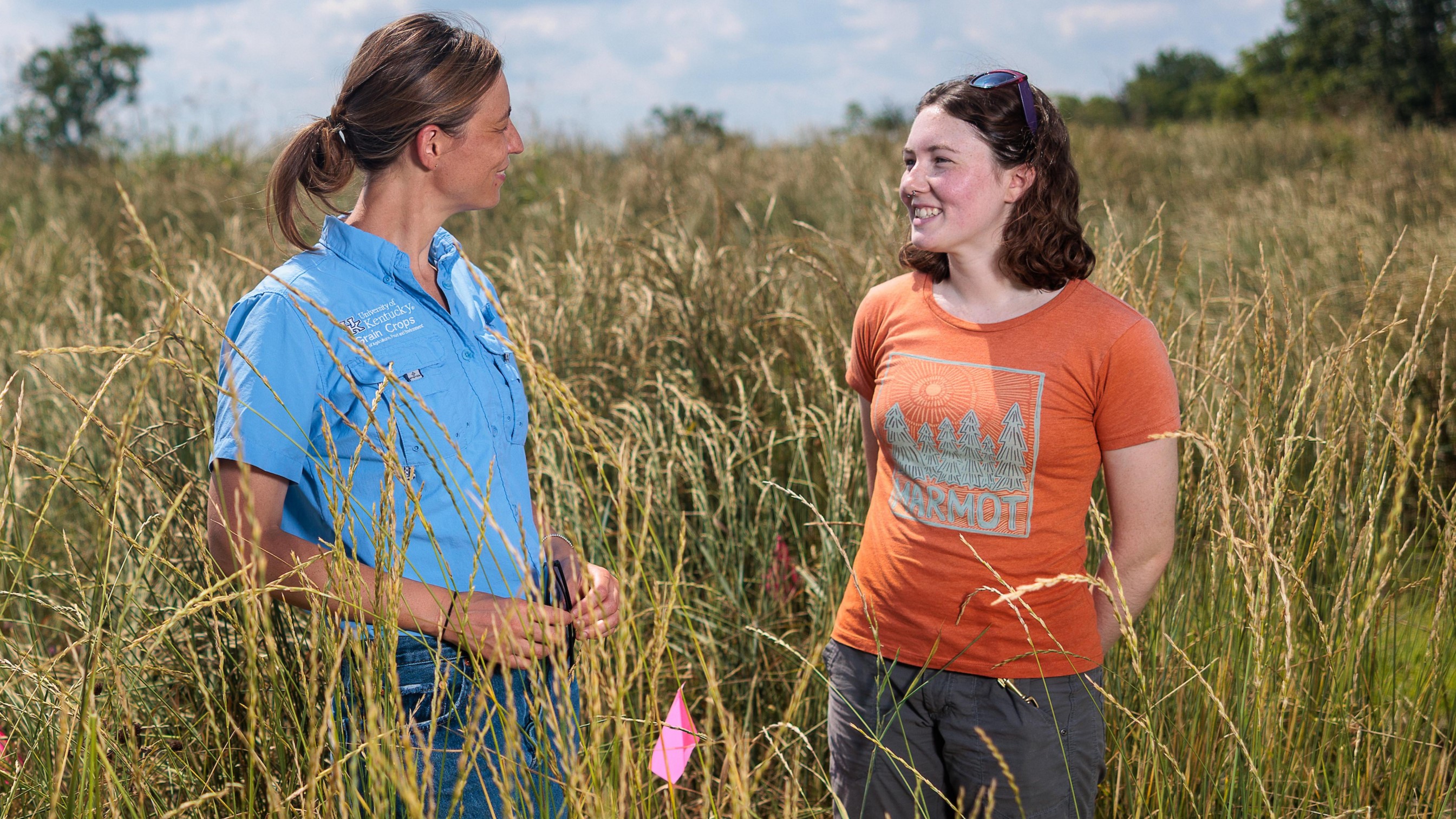University of Kentucky student aiding the future of farming
University of Kentucky student aiding the future of farming


University of Kentucky Martin-Gatton College of Agriculture, Food and Environment student Riley McLaughlin is learning how every handful of soil counts. As part of a study on the perennial grain intermediate wheatgrass, the agricultural ecosystem sciences senior is helping provide an important service to producers: increasing soil health.
To do this, she is working on the study under the tutelage of Hanna Poffenbarger, an associate professor in the Department of Plant and Soil Science (PSS). In her role, McLaughlin tracks soil health changes over time in intermediate wheatgrass plots and compares them to measurements taken in a conventional annual crop rotation. She is also evaluating a method to measure soil movement using mesh bags.
“I stitched together small bags with two layers of mesh,” McLaughlin said. “After we get two inches of rain, I pick them up, dry them and weigh the soil inside. The numbers tell us how much ground moved in each field.”
McLaughlin’s project sits inside a three-year effort testing everything from plant breeding to grain flavor. Riley focuses on the soil-health side.
Why intermediate wheatgrass?
Unlike annual wheat, intermediate wheatgrass stays in the ground year after year. Its deep roots can be more than twice as long as those of common crops, helping anchor soil, add organic matter and feed helpful microbes that build stable soil structure. Researchers think these traits could reduce runoff, improve water infiltration during heavy storms and provide moisture reserves during drought. However, most data published so far come from states farther west.
“Kentucky’s climate and hills are different,” said plant geneticist Lauren Brzozowski, an assistant professor in the PSS, who is involved in the study. “We need local numbers before farmers can decide if intermediate wheatgrass fits their ground.”
That is where Riley’s research comes in. By monitoring soil changes in Kentucky fields, her test gives a direct look at the potential of this crop in our region.
Early lessons
The team planted its first intermediate wheatgrass stands in fall 2023. In 2024 they harvested a small grain crop and then mowed the plants for forage. Riley placed 36 mesh bags — 18 in intermediate wheatgrass, 18 in soybeans — before the spring rains of 2025. Even before completing year one, she has already seen less loose soil in the perennial plots.
“To understand the true impact, we’ll need to collect data over multiple years,” Poffenbarger said. “Riley’s method is low-cost, let’s us track soil movement without disturbing the crop, and it also gives a great hands-on lesson in field research.”
McLaughlin is finishing her undergraduate while starting the first year of an accelerated master’s program. Fewer than 25 students are enrolled in the agricultural ecosystem sciences undergraduate major, which blends plant science, soils and economics.
Looking ahead
The research team will keep measuring harvest yields, grain quality and soil changes through 2026. They are also partnering with several Kentucky farmers who are growing one-acre pilot plots to test combines and gauge market interest.
“Our best outcome is a new option that fits Kentucky fields,” Brzozowski said. “If Riley’s data show real erosion control and our baking tests show good flavor, growers could have another crop to rotate with winter wheat or use on steeper slopes.”
For McLaughlin, the project is already a win.
This material is based upon work that is supported by the National Institute of Food and Agriculture, U.S. Department of Agriculture, under award number 20243864042988 through the Southern Sustainable Agriculture Research and Education program under subaward number 00003818. USDA is an equal opportunity employer and service provider. Any opinions, findings, conclusions, or recommendations expressed in this publication are those of the author(s) and do not necessarily reflect the view of the U.S. Department of Agriculture.
###
Writer: Jordan Strickler, jstrickler@uky.edu
The Martin-Gatton College of Agriculture, Food and Environment is an Equal Opportunity Organization with respect to education and employment and authorization to provide research, education information and other services to individuals and institutions that provide equal opportunities for qualified persons in all aspects of institutional operations and do not discriminate on the basis of race, color, national origin, ethnic origin, religion, creed, age, physical or mental disability, veteran status, uniformed service, political belief, sex, sexual orientation, gender identity, gender expression, pregnancy, marital status, genetic information or social or economic status.
Plant & Soil Sciences Research Students